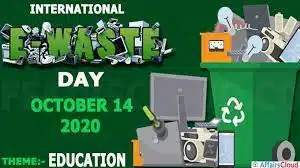International E-waste day brings awareness about the impacts and consequences of e-waste under the slogan “Recycle it all, no matter how small” which usually goes unnoticed.

We mark 14th October as international E-Waste day from the year 2018, a campaign brought up by the Waste Electrical and Electronic Equipment recycling (WEEE) Forum to bring awareness among the public that encourages recycling of electrical and electronic waste that includes all appliances which are not in working condition and usually they are simply discarded in the trash or left in the drawers unused. We are not aware of in what way this waste can bring a bad impact on us and the environment.
According to the survey by organization material focus in the UK, 20 million and above ranging from 5.63 billion USD of E-Waste is accumulated in UK homes and further each of them can sell the unwanted tech and get 200 pounds.
Globally, about 53.6 million tonnes of E-Waste were produced in 2019 – 7.3 kg per person. Talking about India only 22.7% of the e-waste out of the total 10,14,961.21 tonnes generated in 2019-20 in India was collected.
A meager 14.66% is the observed average collection and recycling rate across all continents, with Europe recycling 42.5% of its E-waste and Africa recycling just 0.9%. We don’t know where 80% of the global E-Waste created comes from, where it is disposed of, or what pre-treatment techniques are applied to extract the resource before it is thrown away.

Health effects of E-waste
According to WHO, an increase in the pile of E-Waste must be considered a threat to human health and child development.
The waste is harmful to the workers who try to extract valuables such as gold and copper as it poses a risk of more than 1000 harmful substances including Lead, Nickel, Mercury, brominated flame retardants, and polyclinic aromatic hydrocarbons (PAHs)
Exposure to toxic E-waste by expecting mothers can result in premature births, stillbirth, as well as low birth weight and height.
Considering children they can be seen effects in their growth and development physically and mentally, also prone to less immunity.
Dealing with E-waste
To reduce the adverse effect on human health and nature, E-waste should be monitored first-hand, discarded efficiently by families and communities, and should be provided for reuse to manufacture more durable electronic and electrical pieces of equipment.
The campaign should be promoted to create awareness among all of us to make a healthy and Hygienic

Some help from Recycling companies in India
- Attero- Roorkee-based e-waste management company, Active in 100 cities across 22 Indian states
- E- Parisaraa Pvt Ltd- Based in Banglore is India’s First government approved company since 2005
- Karma recycling – based in Delhi with an online portal for active service for consumers.

THE GENERATION OF 21st IS MOST ANXIETY ONE :
According To WHO’s mental health data shows 0.6 percent or about 264 million individuals worldwide have been affected by anxiety. Read more…













